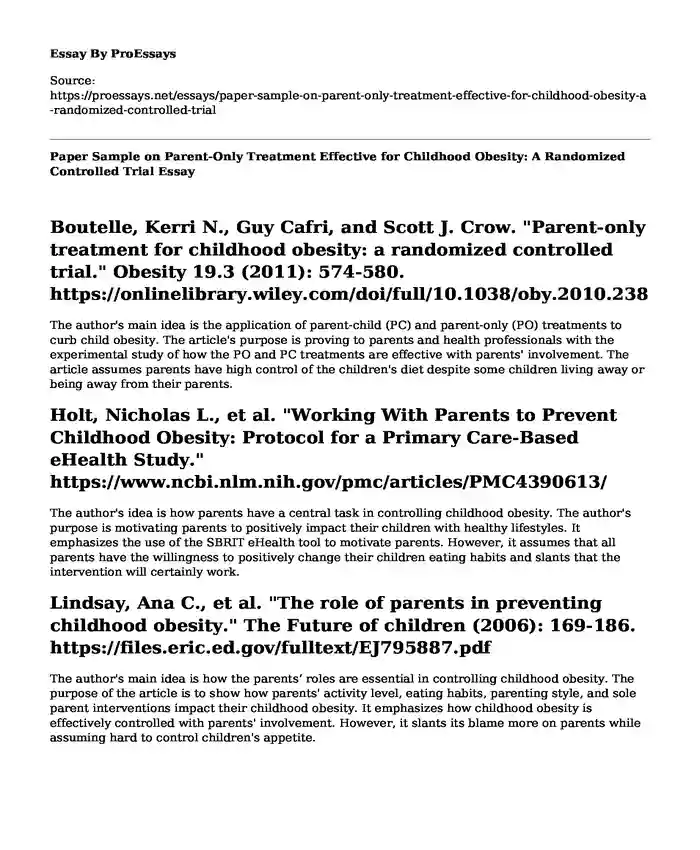Boutelle, Kerri N., Guy Cafri, and Scott J. Crow. "Parentonly treatment for childhood obesity: a randomized controlled trial." Obesity 19.3 (2011): 574-580. https://onlinelibrary.wiley.com/doi/full/10.1038/oby.2010.238
The author's main idea is the application of parent-child (PC) and parent-only (PO) treatments to curb child obesity. The article's purpose is proving to parents and health professionals with the experimental study of how the PO and PC treatments are effective with parents' involvement. The article assumes parents have high control of the children's diet despite some children living away or being away from their parents.
Holt, Nicholas L., et al. "Working With Parents to Prevent Childhood Obesity: Protocol for a Primary Care-Based eHealth Study." https://www.ncbi.nlm.nih.gov/pmc/articles/PMC4390613/
The author's idea is how parents have a central task in controlling childhood obesity. The author's purpose is motivating parents to positively impact their children with healthy lifestyles. It emphasizes the use of the SBRIT eHealth tool to motivate parents. However, it assumes that all parents have the willingness to positively change their children eating habits and slants that the intervention will certainly work.
Lindsay, Ana C., et al. "The role of parents in preventing childhood obesity." The Future of children (2006): 169-186. https://files.eric.ed.gov/fulltext/EJ795887.pdf
The author's main idea is how the parents’ roles are essential in controlling childhood obesity. The purpose of the article is to show how parents' activity level, eating habits, parenting style, and sole parent interventions impact their childhood obesity. It emphasizes how childhood obesity is effectively controlled with parents' involvement. However, it slants its blame more on parents while assuming hard to control children's appetite.
Live Science. Parents Blamed for Childhood Obesity. 9 February 2009. https://www.livescience.com/3293-parents-blamed-childhood-obesity.html
The author's main idea is parents should be blamed for childhood obesity. The primary purpose and emphasis are to inform parents that their eating habits influence their children's weight status as children eat what is served as per parents' decisions. The authors assume that the children adopt eating habits from home despite some adolescents preferring fast foods due to the convenience and taste of the foods.
Mehdizadeh, Atieh, et al. "Impact of parent engagement in childhood obesity prevention interventions on anthropometric indices among preschool children: a systematic review." Childhood Obesity 16.1 (2020): 3-19. https://www.liebertpub.com/doi/full/10.1089/chi.2019.0103
The author's main idea is that parents engaged in their children's obesity prevention programs influence the anthropometric indices of childhood obesity. The author's purpose is to show how parents' failure to participate in their childhood obesity interventions counters positive change. It assumes that the children's intervention has to work with parents' support and engagement. Findings prove the idea that parents' engagement results in anthropometric outcomes.
Rhee, Kyung. THE ROLE OF PARENTS IN PREVENTING CHILDHOOD OBESITY. 19 February 2008. https://www.aapss.org/news/the-role-of-parents-in-preventing-childhood-obesity/
The main idea is that parents adopting healthy behaviors and activity patterns positively impact their children's obesity levels. The purpose is proving to parents to adopt healthy practices which their children can emulate, and parents have to adopt such behaviors first. The author demonstrates the idea by showing how the parents' actions and decisions determine what their children will eat. It assumes that children cannot decide on the food they want to eat.
Sermo. Who is to blame for childhood obesity? Doctors say, parents. 2015 August 2016. https://www.sermo.com/blame-childhood-obesity-doctors-say-parents/
The author's idea is parents ought to be blamed for their children's obesity. Evidence of how 69% of doctors blame parents is provided. The article's purpose is to show parents that they have to take a role in preventing childhood obesity from avoiding the blame and supporting their children's health. The author slants so much on blaming the parents, yet ignoring other factors such as society's food availability.
Work Cited
Boutelle, Kerri N., Guy Cafri, and Scott J. Crow. "Parentonly treatment for childhood obesity: a randomized controlled trial." Obesity 19.3 (2011): 574-580. https://onlinelibrary.wiley.com/doi/full/10.1038/oby.2010.238
Holt, Nicholas L., et al. "Working With Parents to Prevent Childhood Obesity: Protocol for a Primary Care-Based eHealth Study." https://www.ncbi.nlm.nih.gov/pmc/articles/PMC4390613/
Lindsay, Ana C., et al. "The role of parents in preventing childhood obesity." The Future of children (2006): 169-186. https://files.eric.ed.gov/fulltext/EJ795887.pdf
Live Science. Parents Blamed for Childhood Obesity. 9 February 2009. https://www.livescience.com/3293-parents-blamed-childhood-obesity.html
Mehdizadeh, Atieh, et al. "Impact of parent engagement in childhood obesity prevention interventions on anthropometric indices among preschool children: a systematic review." Childhood Obesity 16.1 (2020): 3-19. https://www.liebertpub.com/doi/full/10.1089/chi.2019.0103
Rhee, Kyung. THE ROLE OF PARENTS IN PREVENTING CHILDHOOD OBESITY. 19 February 2008. https://www.aapss.org/news/the-role-of-parents-in-preventing-childhood-obesity/
Sermo. Who is to blame for childhood obesity? Doctors say, parents. 2015 August 2016. https://www.sermo.com/blame-childhood-obesity-doctors-say-parents/
Cite this page
Paper Sample on Parent-Only Treatment Effective for Childhood Obesity: A Randomized Controlled Trial. (2023, Sep 17). Retrieved from https://proessays.net/essays/paper-sample-on-parent-only-treatment-effective-for-childhood-obesity-a-randomized-controlled-trial
If you are the original author of this essay and no longer wish to have it published on the ProEssays website, please click below to request its removal:
- Hand Hygiene among Health Care Workers on Labor and Delivery Unit - Essay Sample
- Family Genetic Risks Analysis Paper Example
- Does Society Have Different Expectations for Boys Then for Girls? Essay
- Questions and Answers on Gun Violence at Harper High School Paper Example
- Essay Example on End-of-Life Simulation: A Vital Nursing Career Experience
- Asthma Diagnosis: Genetically Inherited & Worsening in Spring Weather - Essay Sample
- Essay Example on Interdisciplinary Teams and Geriatric Clinical Care: 3 Decades of Evolution







